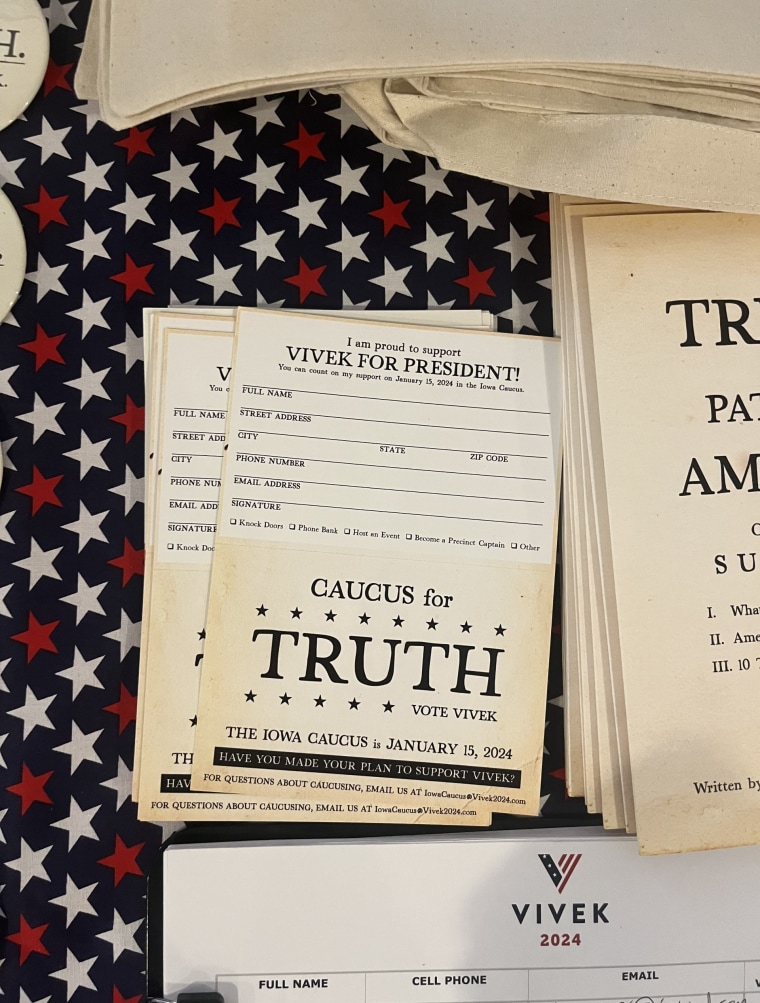Vivek Ramaswamy's zinger-fueled campaign meets the Iowa grind
URBANDALE, Iowa — Crowds are mobbing Vivek Ramaswamy for photos at his campaign events. And while the Republican presidential candidate is obliging, he’s demanding something in return: voters’ signatures.

“No exceptions! Sign up and take a picture,” Ramaswamy said on Saturday, urging Iowans at a campaign stop to sign a caucus card before they could snap a photo. It’s one of the age-old building blocks of caucus campaigns: cards filled out with supporters' personal information, allowing campaigns to get back in touch via phone, email or a door knock later. And it’s a relatively new step for Ramaswamy as he tries to capitalize on his attention-grabbing turn at the first GOP presidential debate.
But Ramaswamy’s ask last weekend was largely ignored, with the Iowans in attendance more interested in capturing their moment with the 38-year-old entrepreneur than taking the steps needed to commit to caucusing for him.
The challenge now facing Ramaswamy has bedeviled presidential candidates before: How to take rising interest and attention nationally and translate it into success on the ground in early-voting states. That starts in the first state to vote next year, Iowa, where Ramaswamy has been hiring staff and making repeated visits in the hope of making a splash.
Caucus cards at a Vivek Ramaswamy campaign event alongside campaign literature and a sign-up sheet.Katherine KoretskiSince the beginning of July, Ramaswamy has hosted the most town hall events in the Hawkeye State among the Republican presidential field, according to an NBC News analysis. He held eight events over two days immediately following last week’s debate, and he will travel to Iowa again this week for four events — followed by 11 scheduled stops in New Hampshire, the next contest on the 2024 calendar.

Ramaswamy spoke to the importance of rallying Iowa caucusgoers in an interview with NBC News, saying “the most influential people in a community are the ones who actually were the ones showing up for the last five months, because they were most plugged in and really earnestly curious about who a new candidate is.”
“Now that many of them are on our side, now they’re actually going to be our multiplier effect in a caucus system,” Ramaswamy continued.
That’s been a model for victorious Iowa campaigns, with early supporters becoming ambassadors in their communities and attracting new ones. For now, the number of Iowans who will be on Ramaswamy’s side come caucus day remains to be seen. The NBC News/Des Moines Register/Mediacom statewide poll, conducted before the first GOP debate, saw Ramaswamy register at 4% first-choice support among GOP caucusgoers.
But the self-funder’s staffing levels in Iowa are among the most robust in the 2024 campaign, neutral observers said, making his presence known even when the candidate is physically elsewhere.
“It’s actually one of the stronger ground games in the state right now,” says Brett Barker, the chair of the Story County GOP and mayor of Nevada, Iowa.
“They had a good group of volunteers march in our county Fourth of July parade, they generally have a representative at our monthly meetings,” he said. “So they are present and putting in a lot of work on the ground.”

Senior adviser Tricia McLaughlin, a consistent presence with Ramaswamy on the trail, said the campaign currently has about 200 volunteers in the state and about a dozen staff.
“We are actively hiring,” McLaughlin said, adding that the campaign has had to make shifts to accommodate greater interest. “We clearly need to get bigger venues,” said McLaughlin, after Iowans were turned away at least twice over the weekend when venues hit maximum capacity.
While Ramaswamy’s campaign has a presence on the ground in Iowa, it’s been less active on the airwaves. Ramaswamy’s super PAC, American Exceptionalism PAC, had only spent $323,000 in Iowa through Aug. 28, far less than groups supporting his competitors, according to AdImpact.
McLaughlin said she doesn’t believe ad spending will be a determining factor this early in the race. “I don’t think a 30-second TV ad can [in] any way make up for being on the ground and meeting people one on one, and answering your questions,” she said.
Republican political strategist Dave Kochel, a native Iowan who worked on Sen. Mitt Romney’s 2012 presidential campaign and Jeb Bush’s 2016 effort, believes Ramaswamy’s faith could be a factor that ends up holding the candidate back in the state. Kochel referenced his experience working for Romney and the questions voters had about his religion.
“If evangelicals in Northwest Iowa had a problem with a Mormon because they just thought the religion was a little funny, you know, that’s gonna be times five with a Hindu candidate,” said Kochel. Romney finished second in the Iowa GOP caucuses in both 2008 and 2012.
For many Iowans, Ramaswamy’s debate performance was reminiscent of 2016. “He showed the public he has a backbone. He reminds me of a younger Trump,” said Darla Chappell, the Jackson County Republican Party chair.
Yet Kochel said that might be just the problem for Ramaswamy, with Trump dominating the current polling in Iowa.
“If you’re agreeing with Vivek Ramaswamy, you’ve already got a candidate. You’re for Donald Trump,” he said.
Katherine Koretski
Katherine Koretski is a 2024 NBC News campaign embed.
Alex Tabet
Alex Tabet is a 2024 NBC News campaign embed.
Bridget Bowman
contributed
.







































